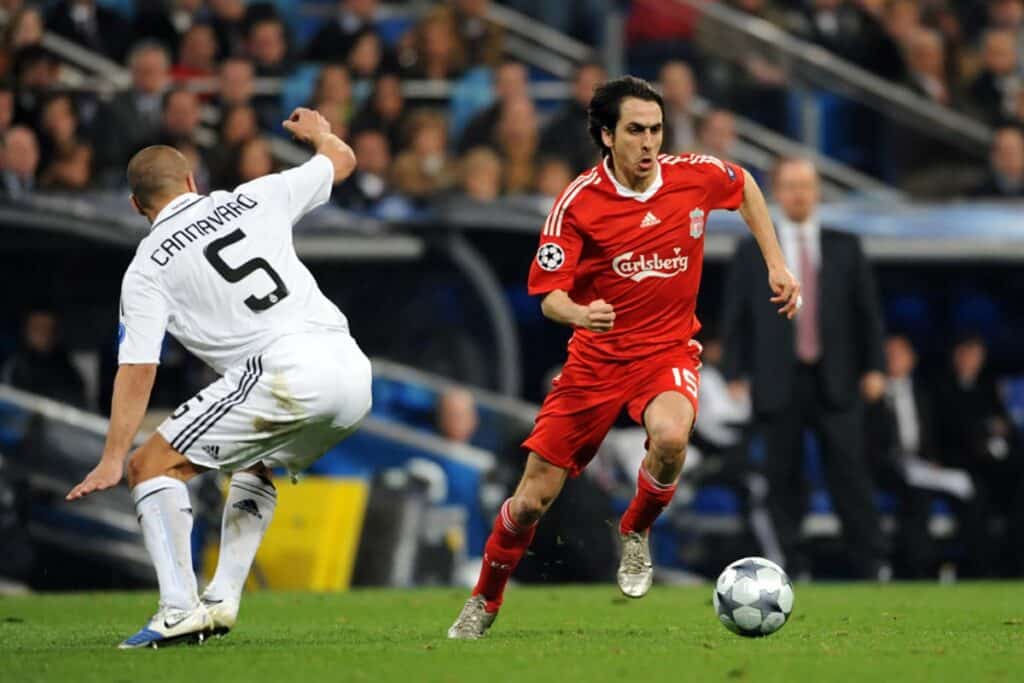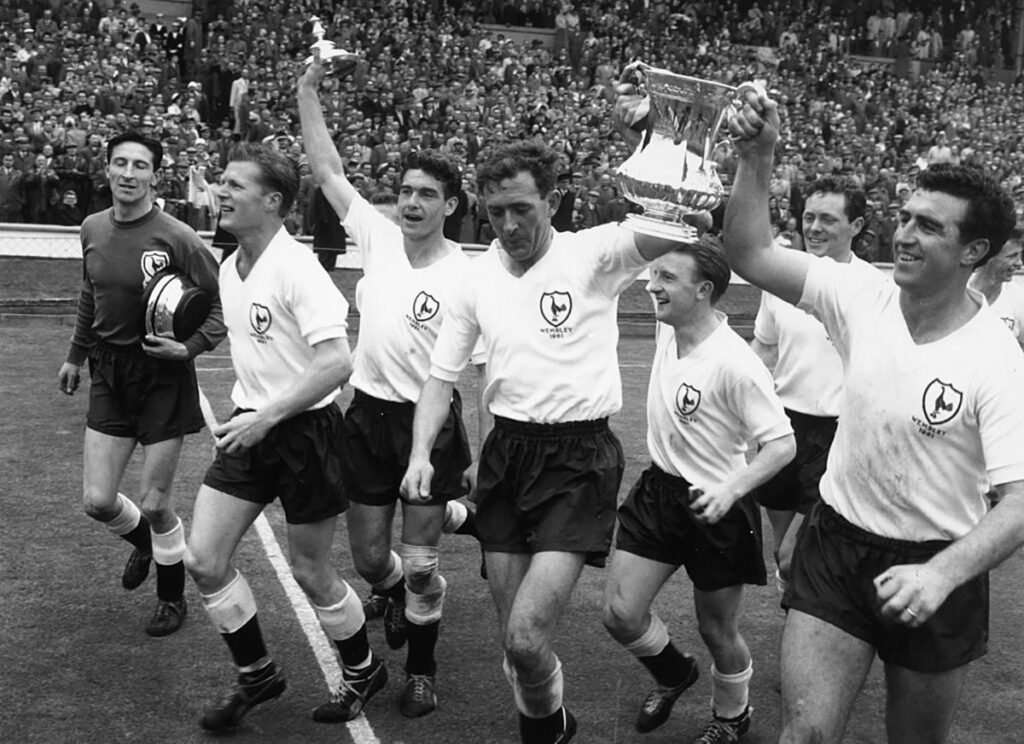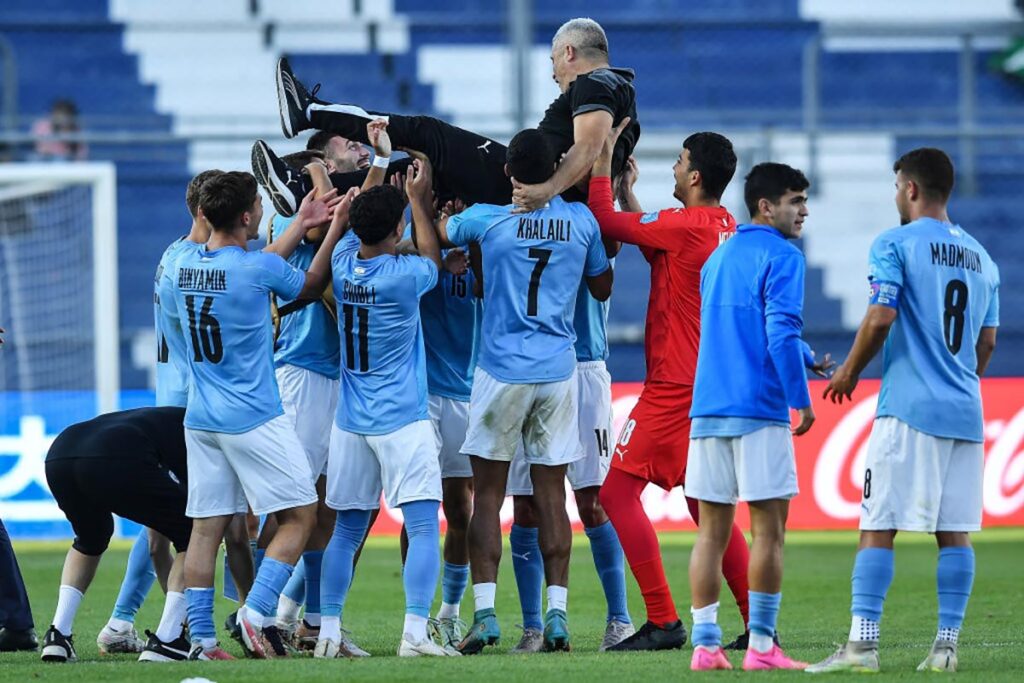
Most people know the history of Jewish contributions to sports like baseball and basketball, where they have made their mark as players, coaches, team owners and enthusiastic fans.
However, far fewer know the deep-seated connection between Jews and soccer, or football as it’s called outside the U.S.
Since the inception of the sport, Jews have made significant contributions as players, managers, analysts, fans, and team owners.
This year, an Israeli team made waves with its outstanding performance at the U-20 World Cup in Argentina — a first for Israel. The team secured third place, stunning spectators and players alike.
After defeating Brazil 3-2 in the quarterfinals, they lost to Uruguay in the semi-finals, and subsequently won a consolation match against South Korea.
THE RESPONSE 🤯
— FOX Soccer (@FOXSoccer) June 3, 2023
Israel U-20s Hamza Shibli equalizes the match! 🇮🇱 pic.twitter.com/2VCBOPCgTv
In honor of Israel’s third-place victory, let’s explore the rich history of Jewish involvement in soccer and why Israel’s impressive U-20 World Cup run matters.
Jewish footballers have excelled on the pitch
Jewish footballers have shown their prowess on the field, with notable players like Yossi Benayoun, Joe Jacobson, Dean Furman and David Pleat — who later managed Luton Town and Tottenham and then moved to soccer commentary.

Former Manchester United and England footballer David Beckham, whose maternal grandfather was Jewish, also identifies as part-Jewish.
And now, the legacy of Jewish footballers continues with Manor Solomon. The Israeli soccer star is making headlines as he finalizes a five-year contract with the historically Jewish football club Tottenham Hotspurs.
Known affectionately by fans as “King Solomon,” he is currently the only Israeli player in the Premier League. The large Jewish community in London reportedly was a huge draw for the 23-year-old when choosing a team to join, in addition to growing up as a Spurs fan.
However, Jewish footballers have struggled to participate in England’s top leagues in recent decades. Since its founding, Jacobson is the only British-born Jew to have played in the Premier League.
“I’ve been asked so many times [about the lack of Jewish representation],” Jacobson told JTA. “I’ve had players come up to me and ask: why are there so few of you?”
Some claim that the economic stability has often dissuaded participation in England’s top leagues.
Historically, the affordability of soccer made it a popular sport among Jewish communities. The lack of equipment made it an easy choice for working-class individuals to participate and hone their skills.
Today, a large number of Jews belong to the middle class and might not consider pursuing soccer professionally.
“If you are from a middle-class background, then maybe you are getting pushed more toward [academia],” Guardian sportswriter Jacob Steinberg explained. “Maybe you are not quite as focused on trying to get into professional sports. It is broadly speaking a working-class sport.”
Jewish involvement in soccer has existed since leagues’ inception
In the late 19th and early 20th centuries, around the globe, Jewish communities took part in establishing soccer leagues and teams.
A significant number of these teams adopted the name Hakoah — meaning “strength” in Hebrew — and many of these teams are still active today.
Some of the most famous Hakoah teams hailed from Vienna, Sydney, Ramat Gan, New York, Berlin, Buenos Aires, Zurich, and Riga, to name a few.
Hakoah Vienna — arguably the most famous early Jewish team and considered “the uncrowned champion of Europe in the early 1920s” — was founded by followers of Zionist Max Nordeau in 1909.
The team attracted the top soccer talent across Europe and amassed an enthusiastic worldwide following.
In 1926, the team arrived in New York, attracting thousands of spectators. Much like the fervor surrounding Sandy Koufax games among Jewish fans, American and British Jews showed their support for Jewish teams as both spectators and participants in local leagues.
The renowned European Jewish club was formally disbanded by the Nazis in 1938.
In 1947, a staggering 43,000 people filled Yankee Stadium to witness the Israeli team Hapoel in action. In the UK, Jewish communities started Sunday Leagues, with the earliest league, made up of all Jewish teams, established in 1899.
Today, tens of thousands of British Jews participate in Sunday Leagues, either to play football or watch the games with their neighbors.
In addition to Sunday Leagues, many Jewish footballers sought out Saturday competitions.
According to Anthony Clavane, a historian at Essex University who focuses on Britain’s Jewish footballing history, many of them wanted to play on the Sabbath to demonstrate their assimilation into British culture.
“They wanted to prove their identity as not being their parents — Yiddish-speaking Eastern European immigrants — but as English Jews who played the English game,” he told JTA.
Several football clubs earned the label “Jewish” due to their history
While some football clubs were formed explicitly as Jewish teams, others have attracted substantial Jewish support over time and have consequently been branded as “Jewish” teams.
The list of popular “Jewish” teams includes Tottenham Hotspur (commonly referred to as “Spurs”), Arsenal, Manchester United, Leeds, Manchester City, Ajax Amsterdam, Roma and Bayern Munich.
Tottenham Hotspur was the favorite team of Brett Goldstein, who played Roy Kent in “Ted Lasso.”

By the 1990s, British Jews were twice as likely to be football fans compared to their non-Jewish counterparts, according to a poll by the Institute for Jewish Policy Research.
“This represented the fact that the community felt not just accepted, but invested in football,” Clavane said. “It was emotionally invested, financially invested. It is almost as if part of your Jewish background is defined by football.”
Fans of the British club Spurs have referred to themselves as “Yid army,” “Yiddo,” and “the Yids,” acknowledging the Jewish history and large Jewish fanbase of the club. In the 1930s, Jewish fans reportedly composed at least one-third of the crowd at Spurs games.
While these names used by Spurs fans have faced wide criticism — in 2022, the team even begged its fans to stop calling themselves or the team any of these names — some fans see it as a reclamation of the derogatory term.
Jewish contributions to soccer extend beyond the field
Jewish representation in soccer extends beyond the field and into the commentary box. The most iconic voice in football is arguably Argentinian Jewish sportscaster Andres Cantor, who works for Telemundo. He gained fame for popularizing the yelling of “GOOOOAAAALLLL” when a team scores.
Others have focused on the business aspect of the sport. In the 1990s, Jewish businessmen like former Spurs chairman Irving Scholar, Spurs chairman Alan Sugar, and vice-chairman of Arsenal David Dein saw England’s passion for football and its potential to spawn a world-class league.
They helped establish the Premier League, which has since become the most successful national soccer league in history.
David Triesman and David Bernstein have both led British soccer, becoming the first Jews to head England’s soccer governing body.
Seven Premier League teams — including Spurs, Manchester United, and Chelsea — have at least partial Jewish ownership. Daniel Levy, a former owner of Spurs, currently serves as the club’s chairman.
Israel’s history in the World Cup
Although soccer is one of the most beloved sports in Israel, its national team has had limited success on the international stage.
Israel has only once qualified for the World Cup. Their 1970 World Cup run resulted in two draws and one loss for Team Israel before they were eliminated from the tournament in the first stage of competition.
Israel’s team was founded when the state was established, succeeding the British Mandatory Palestine national team. The predecessor team competed in five international tournaments between 1934-40.
In 1934 and 1938, British Mandatory Palestine took part in the World Cup. FIFA considers these teams to be early iterations of the Israeli team.
These pioneering squads consisted of players from Jewish teams and British servicemen stationed in British Mandate Palestine.
Team Israel initially competed in the Asian Football Confederation but also participated in competitions with the Union of European Football Associations.
Israel clinched the 1964 AFC Asian Cup, but transitioned to UEFA in 1994, where it continues to compete today.
Why Israel’s historic U-20 World Cup run matters
Israel’s U-20 team represented the diversity of Israeli society: Jews, Muslim Arabs, Bedouins, observant and secular Jews, immigrants, native-born Israelis, Ashkenazim and Mizrahim.
The team’s top scorer was Arab-Israeli citizen, 18-year-old Anan Khalaili, with Hamza Shibli and Ahmed Salman also playing pivotal roles.
“There are no Jews and Arabs on this team,” head coach Ofir Haim said. “There is only one big, united family. If only we would learn to live in such brotherhood and peace in our country.”
According to sports analyst Nadin Aboud Laban, Arab communities in Israel feel immense pride in their players’ performance on the team.
“It makes us happy and proud that despite all the racism we have been through, we are a success,” he said. “We know that there are big doors that will open to them, and this makes us really proud.”
In a country as diverse as Israel, amidst a time of significant political and religious division, Israel’s Cinderella run proved to be a powerful connector. Jerusalem Post columnist Herb Keinon noted that the team’s success “brought brief unity to a divided country.”
“These young soccer players have…succeeded in doing something even more difficult than winning FIFA’s Under-20 World Cup: unite, if just for the duration of the 90-plus-minute match, a sadly divided nation,” he added.
The Zionist dream: “To be a country like any other”

The team’s victory also reflects the long-held Zionist aspiration of being “a country like any other.” Apart from the religious considerations, Jewish thought leaders like Tal Becker have pointed out there have always been three main goals for a Jewish state:
- To be normal, just like every other country
- To be exceptional, a “light” unto the nations
- To serve as a safe haven from antisemitism around the world.
The U-20 World Cup fits into the first category — represents Israel’s desire to be a normal state.
“Since everyday life in Israel can be so challenging, when the national team — or even just one of the country’s sons or daughters — does well in sports, it’s a cause for celebration: ‘Look, we’re normal; we too can excel in sports, we too can make sports headlines the day’s top story,’” Keinon wrote.
It brings to mind a famous quote by former Israeli basketball star Tal Brody. In 1977, after leading Maccabi Tel Aviv to the Euroleague championship against Moscow, Brody declared: “We are on the map! And we are staying on the map — not only in sports, but in everything.”
This sentiment resonates deeply within Israeli culture. Israel’s success at the U-20 World Cup makes a statement to the world, “We are here, and we are to be reckoned with.” It’s a reflection of their aspirations to be considered an integral part of the international community, in sport and beyond.
Originally Published Jun 7, 2023 03:00PM EDT
